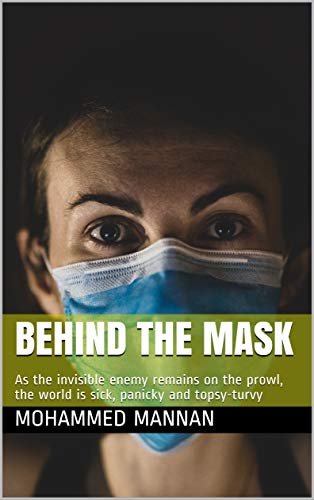TCN News
The first-ever book covering the origins, spread and impacts of the COVID-19 pandemic, ‘Behind the Mask’ by Indian Muslim journalist and author Mohammed Abdul Mannan was released this week on Amazon in both print and digital formats.
‘Behind the Mask’ is the eighth book by Indian Muslim author and journalist from Hyderabad, Abdul Mannan. He has previously worked for Deccan Chronicle, Indian Express, India Today, Khaleej Times, Doordarshan and Zee TV along with a rewarding career in PR and Communications in Dubai, winning the first Qatar Tourism Award for his bestseller, Dubai – A City Making History.
Mannan had already started writing his latest book on COVID-19 on March 22, in an attempt to detail an all-encompassing impact of the 21st century’s second pandemic through engrossing ground reportage. “I finished the book in 55 days,” he says, speaking to TwoCircles.net.
He had begun tracking the Coronavirus spread since late January and worked almost 20 hours daily to report, research, write and compile it into a book form. He informs that an exhaustive collection of 16 chapters in the book covers almost all aspects relevant to us, from economy to environment and vaccines to vacations.
“Unfounded and unjustified hate against Muslims had not occurred in the past pandemics,” he said when asked how is this pandemic different from the earlier ones in modern history. He discussed websites and social media accounts peddling fake news against the disease since the Tablighi Jamaat controversy happened.
“The volley of hate against Muslims without any reasoning,” he states, has spiralled into subsequently increasing attack on Muslim vendors, sellers and traders with mainstream media going all out in launching its anti-Muslim propaganda even in the middle of a disease outbreak. The Coronavirus is in fact “the worst in terms of the number of fatalities and inflictions in modern history,” he opines, as earlier medicines were not much developed but now with technology, a pattern of extensively tracing and warning people through social media has led to a wide network of false narratives and fake news spreading with almost negligible checkpoints. To address this, Mannan has dedicated a full chapter titled “Infodemic,” that captures these experiences and trauma of the Muslim community as a result of the Hindutva campaign of hate speech surrounding the Jamaat incident.
To address the huge communication barrier between vernacular speakers and English readers which is the main source of misinformation in India, he expresses his wish to come out with the book in languages like Urdu and Hindi.
“A fully efficient vaccine is not possible in the next two years, but a relief vaccine may emerge by next year,” he feels when asked about the possibility of a vaccine in the upcoming months. He implies that the disease is a “dynamic one” with impacts so majestic that “data kept updating on an hourly basis,” and with lockdown measures in place coupled with the world over scientists involved in developing drugs for the COVID-19, he has added a chapter on Vaccines for people to understand the circumstances the researchers are working in.
“I think that’s the timeframe given by most experts when the coronavirus curve will flatten,” discusses Mannan, about a possible epilogue to his book. He affirms the looming uncertainty of the virus’s stay and faint possibilities of drugs to curb it, disclosing his plans to publish an updated edition after September “when a very clear picture emerges.”
“We have to reboot the world from every angle,” he says, discussing the long term socio-economic impacts of living in a post-pandemic world. He informed that tourism and travel, the first-hit industries, would “continue to suffer the most for at least two years if normalcy returns early.” Additionally, the economy, health and education would require a total transformation even if a vaccine is developed soon.
“Diseases don’t see which religions we follow but strike at their will at the weakest,” he states. Speaking about the multiple crises in government policies and state failure, he feels another book “on our experiments with the Coronavirus pandemic in terms of governance and other issues will be ideal.”
Addressing readers of ‘Behind the Mask’, Mannan says that the outcome of this disease is of concern to everyone and therefore at such difficult times, people must unite to observe safety guidelines irrespective of their cultural and religious biases. As a message to his readers, he adds, “Communities have opportunities to find their names in history by excelling in various ways,” and this is the time to be an informed and responsible community.


